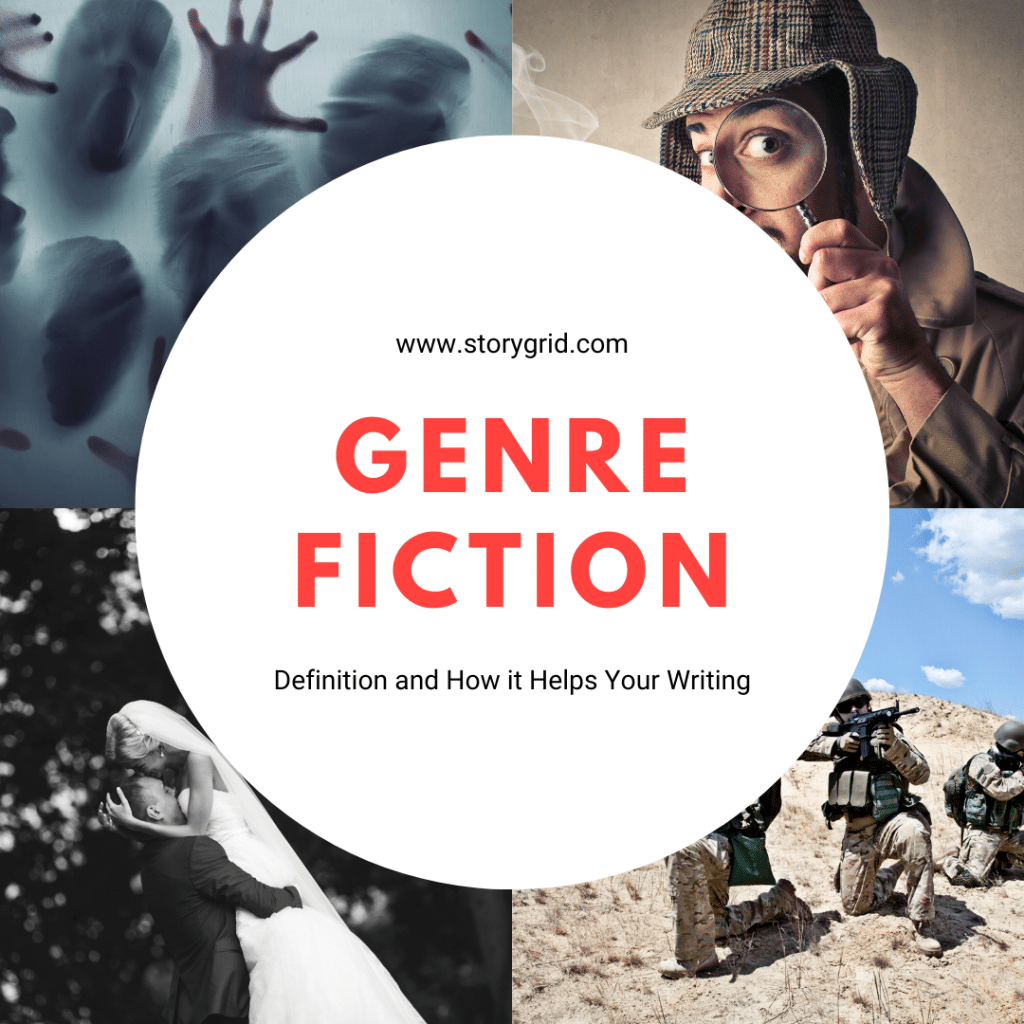Download the Math of Storytelling Infographic
When we hear a book or movie described as “genre fiction,” the speaker is usually denigrating the story. The designation connotes cheesy slasher films, lame mysteries, Ed Wood-esque science fiction, and bargain-bin romances.
When all of the above can be categorized as one of a particular kind of Genre, Genre is not limited to pulp fiction.

Genre is a Categorization
Genre’s an incredibly broad way of cataloging all Stories. Like the category Coffee includes all varieties from Sumatra to Folgers.
Genre Fiction includes War and Peace as well as the pedestrian (to some people) entertainments described above.
Genre is the Most Important Decision
Those choices will tell the reader what they are in for if they pick up your book. They will direct all efforts from your publisher from the front cover art to the publicity tour. If you are not writing in “genre,” you’re lost. Every Story ever told has genre classifications.
Examples of Genre Classifications of Fiction
- The Corrections is a Realistic, Long form, Mini-plot, Society, Domestic, Drama.
- Moby Dick is a Realistic, Long form, Archplot, Action, Adventure, Monster, Drama.
- The Iliad is a Fantastic, Long form, Archplot, War/Education, Literary Story.
Genre’s Purpose
Deciding what Genre/s your Story will inhabit will also tell you exactly what you need to do to satisfy your potential audience’s expectations.
Genre will tell you what you the crucial conventions and obligatory scenes that you must have in your novel. Knowing Genre is the single best way to avoid doing a helluva lot of work for naught. If you don’t know you are writing a horror novel and you spend four months working on a character’s past history for an epic flashback, you’re wasting your time.
Better to know up front what genre best fits the idea or theme you want to convey to your audience before setting off on the work, no?
Most importantly, if you fail to abide by your genre’s requirements, you will not write a Story that works.
Genre is the Path to a Working Story
The only way to write a Story that works is to know exactly what genre/s you are exploring and delivering exactly what is required from those genres.
You must know what your reader is expecting before you can possibly satisfy her.
And yes, if you are writing a Story, you must think of your audience. A Story means nothing if it is not experienced. If you do the work exceptionally well, you do that thing that we all dream of, you’ll over deliver on audience expectations.
You won’t just satisfy them, you’ll shock and invigorate them. And the reader will have an experience that they will never forget.
Start with Genre
So the first question we need to ask ourselves is What are the Genres of our Story and what will I have to do to meet those genres expectations?
Genre craft demands innovation. And that innovation is found in the way a writer handles audience expectations… the obligatory scenes and conventions of your chosen genres.
This requirement is exactly the same thing that Steve Jobs and Apple faced when they decided to create a new cellphone.
Jobs knew that the iPhone had to be compatible with cellular networks, at least one of them. He knew that it had to “ring.” He knew that the connections between callers had to be clear. And tens of other obligations and conventions (a North/South hearing and speaking convention) had to be met. So the question Jobs asked himself was not “How do I make something completely unique and change the way people speak to each other?” but “How do I build on and reinvent those things that phone users demand while also giving them an intoxicating original experience?”
Jobs worked inside the phone “genre,” and then moved the genre forward.
As you’ll remember, the first generation of iPhones had a tendency to disconnect in the middle of calls. The obligatory antenna required in the phone did not deliver. It wasn’t until Apple fixed that problem that the iPhone moved from Apple baseline cult first-generation adopters (its genre experts) to middle managers abandoning their Blackberrys. The core fanatics cut Apple some slack on the first iteration of the iPhone, but they didn’t evangelize to non-cult members until all of the bugs were out of it.
Genre Works the Same for Books
Win over the experts and keep banging away at the keyboard. When you’ve knocked out something extraordinary, the experts will beat down their neighbors’ doors to get them to read your book.
I think one thing is for sure. Apple opened up every single cell phone they could find to see what they all did and how they did it before they started working on the prototype of the iPhone. Shouldn’t writers do the same thing?
The Definition of Genre Fiction
Genre fiction is a way of categorizing your story so you will deliver a story that your reader loves while innovating on the obligatory scenes and conventions they have come to expect.
Dig Deeper into Genre
Here are some more article to dig deeper into your understanding of genre fiction:
- Genres of Writing
- Action Genre
- Horror Genre
- Crime Genre
- Western Genre
- Thriller Genre
- War Genre
- Society Genre
- Love Genre
- Performance Genre
- Fantasy Genre
- Internal Genre
- Worldview Genre
- Status Genre
- Morality Genre
Download the Math of Storytelling Infographic
Share this Article:
🟢 Twitter — 🔵 Facebook — 🔴 Pinterest
Sign up below and we'll immediately send you a coupon code to get any Story Grid title - print, ebook or audiobook - for free.
(Browse all the Story Grid titles)